The Emergence of The Modern Enterprise
There’s no question about it — the complexity and expanse of data can be overwhelming. In this article, we’ll explore how the Modern Enterprise leverages cutting-edge, AI-powered technology to turn innovation data into meaningful insights.
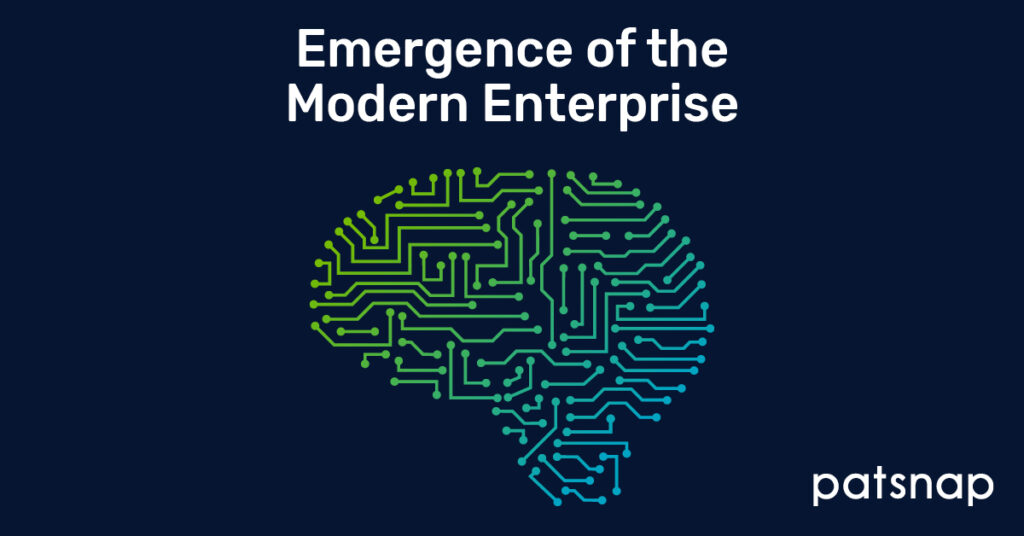
The modern business landscape is highly competitive and volatile. Ongoing disruptions, including technological convergence, geopolitical tensions, supply chain issues, and the global pandemic have heightened the need for businesses to adopt a data-first approach to business. Through operationalizing data and using it as a guide to inform strategic decision-making, organizations are better prepared to navigate unexpected changes, improve their processes, stay ahead of emerging trends, and defend their market positions.
Companies at the leading edge of generating and making sense of data are known as “The Modern Enterprise.” These organizations know how to use data to ask the right questions, attract and retain top talent, and future-proof their businesses by having a data-oriented mindset.
At PatSnap, we’re proud to partner with thousands of Modern Enterprises worldwide, acting as their innovation data backbone to key business units for the collection, operationalization, and making sense of rich and diverse data to better understand and capitalize on new technology-enabled paradigms.
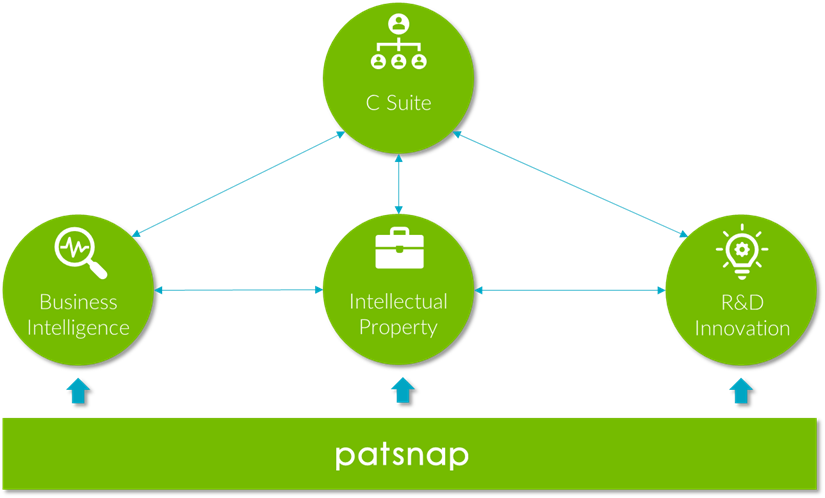
Artificial Intelligence and the Modern Enterprise
Years ago, “artificial intelligence” (AI) was a secretive term used by knowing professionals behind closed doors. Now, investments and interest in AI-powered technology are booming — with machines capable of learning, analyzing, and solving many of the world’s most pressing problems.
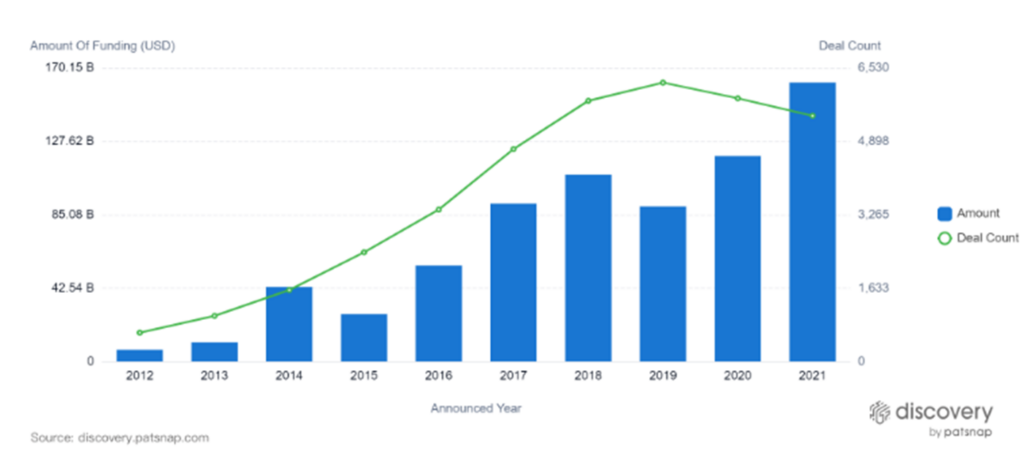
VC Investments into the artificial intelligence market over the past 10 years indicates a continuous increase in both the number of investments and the total deal value, with a clear peak in 2021 at $161 billion.
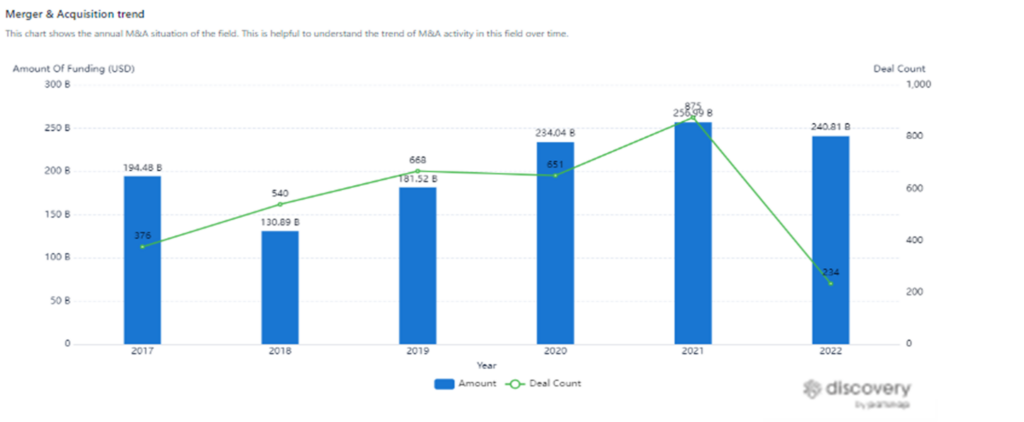
M&A activity data further indicates that AI is a field prioritized by both VC firms and operating companies that wish to enrich their product offering or competitive advantage by quickly absorbing new market entrants or specialized AI companies.
AI-powered technology empowers organizations to analyze and collate data from around the world in a matter of seconds or minutes and extract meaningful, actionable insights. This process accelerates the research and discovery phase, enables companies to test and validate ideas prior to roll out, and expedites innovation.
The current crisis, although waning, serves as a warning for the future: To succeed and grow, organizations must be prepared to adapt to increasingly turbulent and unforeseeable events.
AI-powered platforms with advanced analytics are fueling startups that will disrupt established industries by identifying points of entry into markets with unique solutions, as they now can test and validate ideas in a fraction of the time. Additionally, larger, established organizations that embrace the data-first “Modern Enterprise” mindset will have significant strategic advantages including the ability to solidify their market positions, innovate faster, retrain key talent, drive positive societal change, and optimize business resources. This is the beginning of a conscious business environment that will thrive on data-driven innovation and transformation.
The sheer volume of available global innovation data is growing at an exponential rate, consisting of tens of thousands of zettabytes and millions of unique information sources. The growth continues to be driven forward by internet and broadband access, cellular phone use for professional and personal transactions, and social media.
The complexity and expanse of data can be overwhelming, which begs the question: How does “The Modern Enterprise” turn innovation data into meaningful insights?
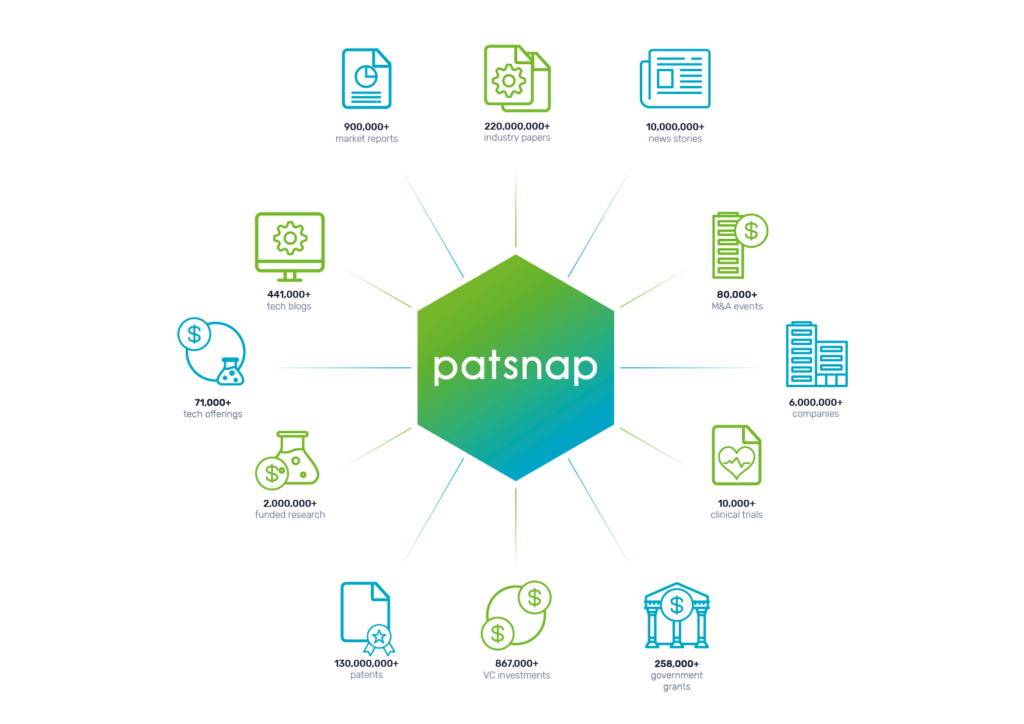
Three words: Connected Innovation Intelligence (CII).
CII is the process of using AI-powered technology to analyze billions of global data points, segment them by keyword defined technology domains, industries and relevance, and connect them together in a way that makes sense. This process enables users to quickly sift through vast amounts of data, correlate relevant data, and gain a 360-degree view of a topic, such as a company, an industry, a technology area, or an entire market.
These comprehensive datasets are used to support companies in a wide array of industries, like automotive and transportation, aerospace, nutrition, biochemical research, and life sciences/healthcare. Even the luxury fashion industry is benefiting from technological opportunities in partnership with the biochemical industry as new sustainable and eco-friendly materials have been made possible with data-driven innovation.
The New Business Paradigms in Automotive Innovation
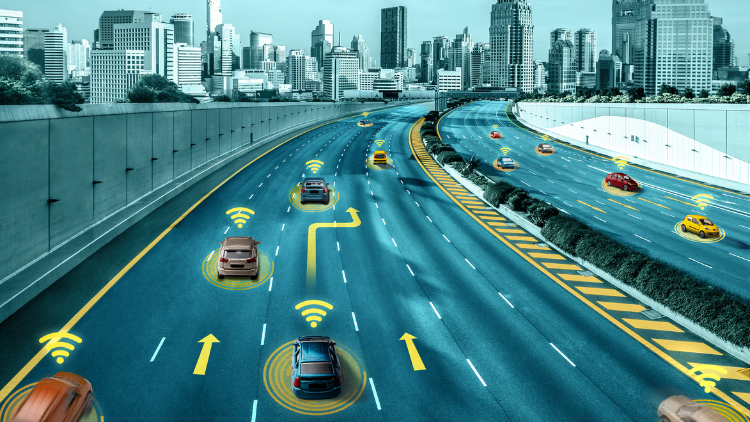
As AI-powered vehicles become more sophisticated (and eventually fully autonomous) we will eventually start to create new markets that will have a profound economic and societal impact. For example, it is estimated that autonomous taxi fleets – by more aggressive models – will attribute more than $2 trillion to GDP in the U.S. alone by 2035, and by making vehicles fully autonomous, cars would become a revenue source – rather than a cost source – which can be rented out as part of a distributed autonomous taxi network.
Additionally, with detailed analytics, companies can better understand their customers and predict purchasing behavior. By interpreting things like past car purchases, online shopping behavior, and demographics, they can design personalized marketing campaigns and share the information that individual buyers find most relevant. They can also locate dealerships in the most strategic areas for the convenience of customers and build long-term brand loyalty.
The implications are obvious. For car companies to be competitive in the future, they need to leverage advanced AI systems to gather and analyze big-volume datasets and use that intelligence to make decisions across all aspects of their business, from engineering to sales and marketing, and service and supply chain. If not, they risk being left behind.
In essence, data allows automotive organizations to understand how technological advancements, changing consumer behaviors, and emerging markets are likely to disrupt the industry so they can proactively plan for the future. As our advancements in AI technology continue, profound business paradigm shifts in the automotive industry are likely to follow. These advancements may alter the urban landscape, our daily lives, and the economic structures we live in.
AI-Powered Technology and Healthcare Innovation

In the healthcare space, vast amounts of historical and new global data are changing the delivery and consumption of healthcare. Hospital and medical records, clinical trials, and enormous volumes of health-related intelligence from the use of wearable tech, are creating high-value opportunities to transform and advance modern medicine. As companies in the pharmaceutical, medical technology, and patient care fields collaborate with data scientists using AI and machine learning-driven analytics, they have the potential to revolutionize the industry.
With the assistance of AI-powered analytics, collected information about heart rates, blood pressure, sleep patterns, and physical activity can be analyzed to improve the accuracy of diagnostics. With an improvement in diagnosing diseases and advanced DNA sequencing, treatment can become more personalized and lead to better outcomes. Advancements in pharmaceutical research and development, seeking cures for the plagues of the modern world, will be dependent on AI-powered platforms that can collect, synthesize, and deploy data to drive innovative solutions.
Closing Thoughts: AI Will Be at the Forefront of Innovation
Every industry is beginning to understand the benefits of data applications that integrate AI technology and global innovation data to achieve business objectives. By reaching a far deeper understanding of consumers and market trends, companies can identify new value proposals and improve how their goods are manufactured, shipped, and consumed. In many industries where products are perishable, the benefits of more flexible decision-making, cost effective production, and responsiveness to the environment could be astronomical.
We are witnessing an explosion in information never seen before. With recorded digital artifacts from publications and scanned data, sensors, and even connected vehicles and appliances. Almost everything we use, handle, wear, and work with now generates data by design. This data is not only transforming businesses, but it’s also changing how we view the landscape of commerce.
Ultimately, the future growth of industry and innovation will be driven by data and those who deploy sophisticated analytics to make sense of it. As the world moves forward, opportunities will abound for entrepreneurs, corporate leadership, and cutting-edge innovators to seek out new ventures that create cultural, societal, and economic value for the current and future generations. And cutting-edge technology – AI and machine learning – will be at the forefront of that innovation journey, providing precise, actionable intelligence for the decision makers of The Modern Enterprise.
_____
Author Bio:

Carl Rosen is PatSnap’s first Senior Thought Leadership Manager, dedicated to helping the modern enterprise and its creative minds accelerate innovation with Connected Innovation Intelligence. With international and frontline experience working at the intersection of business, innovation, and intellectual property strategy, Carl brings a unique perspective on the industry and the transformational impact of AI-powered technology and machine learning. A creative futurist with a passion for culture, innovation, and people, Carl is a frequent panelist at events and speaker at universities, focusing on topics relating to the future role of intellectual property as a key business and data asset. Carl holds an LL.M from the School of Business, Economics, and Law, Gothenburg, and an M.Sc. in Entrepreneurship and Business Design from Chalmers University of Technology, Gothenburg.